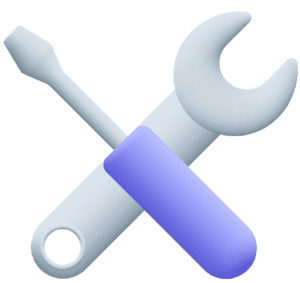Research and planning are essential elements in PPC marketing. To ensure the best results in your campaigns, you must:
- Identify your audience and key demographics
- Establish what keywords you need to bid on
- Monitor your campaigns and track their progress
But, with so many aspects of your marketing campaigns to oversee – such as SEO and digital PR – it’s difficult to find the time to juggle it all.
That’s why so many marketing teams and businesses turn to PPC automation systems. Not only does it help them save valuable time, but it also helps to avoid human error.
Read on to learn more about our four favourite PPC tools. Discover why you should use them, and how they can help your PPC campaigns succeed.
Google keywords planner is the obvious choice fro all PPCers out there. Lead PPC expert George says:
“We utilise google keyword planner constantly, this is Google ads’ native keyword research tool and is a regular part of the research and build stages for clients”
Lets take you through the lesser-appreciated tools that should be used in all your PPC campaigns…
Google Ads Editor
Google is the most popular search engine used worldwide. So, your focus should lie on using its platforms to help your ads reach its target audience. With Google Ads Editor, you can use it to oversee multiple campaigns, as well as a vast list of keywords and ads.
Why should you use it?
Not only is Google Ads Editor free, but any business with any size account can use it. Some of its features include:
- Editing tools: These allow you to make multiple changes quickly and at the same time
- Ad copy management: This function means you can search for and replace ad copy across multiple ad groups or campaigns
- Offline working: You can also use a variety of functions within Ad Editor without an internet connection
Semrush Keyword Magic Tool
Most SEOs love and utilise SEMrush’s Keyword Magic Tool in their work. But, PPC marketers might also find it useful within their campaigns. The resource presents you with extensive Keyword data, allowing you to deep-dive into an entire market. You can even save your research as you go.
Why should you use it?
A lot of PPC and SEO platforms have great keyword research tools, but SEMrush’s Keyword Magic Tool stands out for various reasons. For example, the platform includes functions such as:
- Long-tail keyword research: This allows you to search long-tail keyword queries as well as head terms – which is especially useful for those running voice search campaigns
- Specific keyword analytics: Provides the option to view exact-match keywords, as well as broad-match and phrase-match keywords – ideal for those looking to explore niche markets
- SERP data: Perfect for those looking to position their ads within featured snippets who want to understand what their audience is asking
Optmyzr
Optmyzr is a PPC management platform that allows you to simplify your campaign processes to get the best results and grow your business. Many companies use it to automate, audit, and report on their paid media campaigns.
Why should you use it?
Optmyzr’s tools give you control over your campaigns so you can be sure they’re running as efficiently as possible. This includes:
- Keyword management: Optmyzr identifies new keyword opportunities, such as negative keywords, as well as organising your lists into logical groups
- Regular account audits: The platform conducts regular audits of search engines like Google, offering real-time recommendations so you can improve campaign performance
- Ad optimisation: Not only does Optmyzr offer features which analyse ad copy so you can make it more persuasive, but it also tests multiple variations of ads to find the best-performing one
Survey Sparrow
Research can help PPC marketers learn more about their audience. That’s why so many turn to platforms like Survey Sparrow – to gather feedback from their customers about ad and user experience.
Why should you use it?
SurveySparrow’s features make it easier to understand your audience better, so you can improve your PPC campaigns. For example, the platform provides:
- Customer satisfaction management: You can use SurveySparrow to see your audience’s perception of your ads via its measured satisfaction levels – meaning you can identify areas of improvement
- Competitor analysis: Get insights into how your customers view your competitors, what their campaigns are doing that’s working, and ultimately inform your future campaigns
- Landing page optimization: SurveySparrow also provides feedback from your audience on your PPC landing pages – see what converts and what content gaps you can take advantage of
Need help getting started? Turn to our PPC experts
Our expert PPC Team can take the weight of marketing off your shoulders. Dominate the market with our in-depth reviews & campaign action plans. We’ll even see it through to help you get the best results.
Interested? Get in touch today.
FAQs
Answered by Callum Leonard
What is PPC automation?
PPC automation helps companies streamline their campaigns with tools such as customer feedback, competitor insights, and management of manual processes. Overall, it helps businesses save time when overseeing a campaign and monitoring its progress.
What is the most used PPC platform?
Google Ads is the most used PPC platform. Not only does it work alongside the world’s biggest search engine, but it’s user-friendly for both small and large businesses.
How does ad targeting differ for local audiences compared to broad audiences?
Location targeting is extremely useful in PPC for choosing what audience types you want to reach. Your ad copy may have more specific location-based keywords for a local audience compared to broad one. We would recommend keeping your USPs, ad extensions etc the same across campaigns if you know they are performing effectively.
How much time needs to be put into research before a campaign is set live?
Keyword research definitely shouldn’t be rushed. Enough time needs to be spent ensuring that you have keywords that are worth targeting by looking at the search volume. Competitor research also needs to be carried out to see if the budget can compete for certain keywords in your industry.













